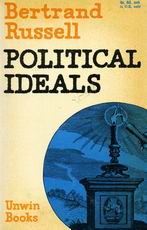

|
|

Political Ideals
Russell, Bertrand
http://www.connexions.org/CxLibrary/Docs/CX5673-RussellPoliticalIdeals.htmhttp://www.gutenberg.org/etext/4776 Publisher: Unwin Books, London, United Kingdom Year First Published: 1917 Year Published: 1963 Pages: 93pp Resource Type: Book Cx Number: CX5673 Russell argues that the aim of political institutions is to make the lives of individuals as good as possible through the cultivation of the individual's creative impulses. Abstract: Russell argues that the aim of political institutions is to make the lives of individuals as good as possible through the cultivation of the individual's creative impulses. While acknowledging the role and influence of government, he ultimately emphasizes that inspired individuals are the source of potential reform. Originally intended to be delivered through lectures, Political Ideals is divided into 5 chapters. Chapter 1 describes the book's central concepts of creative and possessive impulses. While possessive impulses, by driving the use of force in acquiring zero sum material goods, are the primary cause of suffering, creative impulses is the necessary condition for realizing individual potential. Hence, good political institutions establish not only security, liberty and democracy, but actively encourage individual creativity. Consequently, Chapter 2 argues for the abolishment of capitalism as it perpetuates man's possessive impulses. Chapter 3 suggests that while state socialism's goals might be freedom and justice, its proposed reforms are insufficient as it fails to provide a democratic distribution of power. Chapter 4 argues that while state control is never justified in individual thought, some state intervention is necessary to minimize private use of force in the realm of material goods. Chapter 5 suggests that mankind is essentially united by a common interest and argues for the establishment of a supranational government to help facilitate international cooperation. Ultimately, Russell is optimistic about positive institutional reform and the elimination of unnecessary world suffering. He stresses his alternatives as not fundamentally impossible to achieve. The chief obstacle is inspiring man with a clear vision of what life could be. Political Ideals is an attempt to fulfill that vision. [Abstract by Jared Ong] Subject Headings |